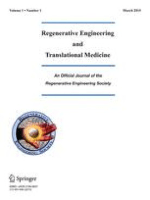
TISSUE & CELL
Scope & Guideline
Innovating Insights into Developmental Biology
Introduction
Aims and Scopes
- Tissue Engineering and Regenerative Medicine:
The journal publishes research that explores the development and application of biological scaffolds, biomaterials, and stem cell technologies for tissue repair and regeneration. - Cellular Mechanisms and Pathways:
A significant focus on the molecular and cellular mechanisms underlying various biological processes, including differentiation, apoptosis, and responses to stress, particularly in the context of disease. - Innovative Therapeutic Approaches:
Research on novel therapeutic strategies, including the use of stem cells, exosomes, and bioactive compounds, to address various health conditions and improve tissue healing. - Disease Models and Experimental Studies:
The journal features studies employing in vitro and in vivo models to investigate pathological processes and the efficacy of potential treatments, particularly in cancer and degenerative diseases. - Biomarkers and Diagnostic Tools:
Research that identifies and validates biomarkers for disease diagnosis and prognosis, which are crucial for personalized medicine approaches.
Trending and Emerging
- Exosome Research and Applications:
There is an increasing trend in the study of exosomes derived from stem cells and their potential therapeutic applications, particularly in promoting tissue regeneration and modulating immune responses. - Bioengineering and Smart Biomaterials:
Research on the development of smart biomaterials that respond to environmental stimuli and promote specific cellular behaviors is gaining traction, indicating a shift towards more dynamic and functional tissue engineering solutions. - Cellular Senescence and Regeneration:
Studies exploring the role of cellular senescence in tissue aging and regeneration are emerging, focusing on how senescent cells can influence healing processes and the development of age-related diseases. - Personalized Medicine and Targeted Therapies:
An increasing emphasis is placed on personalized approaches in regenerative medicine, particularly the tailoring of stem cell therapies and biomaterials to individual patient needs and disease characteristics. - Microenvironmental Influences on Cell Behavior:
Research that investigates the impact of the cellular microenvironment on stem cell behavior and differentiation is gaining momentum, highlighting the importance of niche interactions in tissue engineering.
Declining or Waning
- Traditional Cell Culture Techniques:
There appears to be a reduction in studies solely reliant on conventional two-dimensional cell culture systems, as researchers increasingly adopt advanced methodologies such as 3D culture and organoid models. - Basic Histological Studies without Therapeutic Context:
Research that focuses solely on histological descriptions without linking findings to potential therapeutic applications or mechanistic insights is becoming less prevalent. - Non-specific Animal Models:
The use of non-specific animal models in research has declined, with a growing emphasis on more translational models that better mimic human diseases and therapeutic responses.
Similar Journals

Organogenesis
Unveiling the Complexities of Organogenesis.Organogenesis is a leading journal published by Taylor & Francis Inc, dedicated to advancing the field of developmental biology and regenerative medicine. With an ISSN of 1547-6278 and E-ISSN 1555-8592, this journal spans an extensive research scope that includes embryology, transplantation, and biomedical engineering, distinguishing itself as a crucial platform for researchers and practitioners alike. Its impact is reflected in its performance across various categories in 2023, earning Q3 rankings in Biomedical Engineering and Embryology, Q4 in Developmental Biology, and Q2 in Transplantation, showcasing its reputable standing among peer journals. Moreover, with Scopus rankings indicating strong positioning in the fields of medicine and biochemistry, Organogenesis is essential for those looking to publish or stay updated on pioneering research. The journal facilitates rigorous peer-review and offers a forum for disseminating innovative findings, making it an invaluable resource for academics, professionals, and students committed to understanding the complexities of organism development.

Regenerative Engineering and Translational Medicine
Exploring the Frontiers of Biomedical EngineeringRegenerative Engineering and Translational Medicine is an esteemed academic journal published by Springer Heidelberg, focusing on the interdisciplinary fields of biomaterials, biomedical engineering, and cell biology. With an ISSN of 2364-4133 and an E-ISSN of 2364-4141, the journal has carved a niche for itself since its inception in 2015, showcasing cutting-edge research that bridges the gap between scientific findings and practical applications in regenerative medicine. As a recognized platform in its field, it is currently positioned within Q3 quartiles in biomaterials, biomedical engineering, and medicine (miscellaneous), with a Scopus ranking that reflects its growing influence among peers. The journal aims to disseminate high-quality, peer-reviewed articles that highlight advancements in regenerative engineering, further advancing both theoretical and applied research. Scholars and practitioners seeking to stay at the forefront of the ever-evolving landscape of regenerative health solutions will find invaluable insights and innovations within these pages. Join a community of leading thinkers and explore the journal's comprehensive research contributions, which are crucial for fostering partnerships between academia and industry in the quest for transformative medical solutions.

CELL AND TISSUE RESEARCH
Innovative Insights into Cellular and Tissue ResearchCELL AND TISSUE RESEARCH, published by Springer, is a premier journal dedicated to advancing the field of cell biology, histology, pathology, and forensic medicine. With a proud history dating back to its foundation in 1924 and continuing its legacy, this journal has established itself as a vital source for innovative research, facilitating the dissemination of significant findings that contribute to the understanding of cellular and tissue dynamics. Hailing from Germany, the journal exhibits an impressive standing in the academic community with a 2023 impact factor reflected in its category quartiles: Q2 in Cell Biology, Q1 in Histology, and Q1 in Pathology and Forensic Medicine. It ranks notably within multiple Scopus categories, including 32/208 in Pathology and Forensic Medicine and 13/62 in Histology, showcasing its high percentile rankings of 84th and 79th, respectively. Researchers, professionals, and students benefit from its extensive coverage and rigorous peer-review process that ensures the integrity and relevance of its published works, thus making it an essential resource in the scientific community. While it operates under a subscription model, its commitment to quality and impact makes it an indispensable journal for anyone engaged in cellular and tissue research.

npj Regenerative Medicine
Unlocking the Potential of Cellular Innovation.npj Regenerative Medicine, published by NATURE PORTFOLIO, is at the forefront of research and innovation in the field of regenerative medicine, fostering a deep understanding of cellular and molecular processes that can be leveraged for therapeutic advancements. Launched as an Open Access journal since 2016, it ensures wide dissemination of knowledge, allowing researchers, professionals, and students to access high-quality articles without barriers. With an impressive impact, it holds Q1 ratings across multiple categories including Biomedical Engineering, Cell Biology, Developmental Biology, and Medicine (miscellaneous) as of 2023, indicating its critical role in shaping contemporary scientific discourse. The journal ranks notably within the top 10% in multiple Scopus categories, indicating its commitment to publishing pioneering research that addresses pressing challenges in regenerative therapies. Addressing the dynamic convergence of disciplines, npj Regenerative Medicine is poised to not only impact academic thought but also translate into clinical applications, making it a pivotal resource for those invested in the future of medicine.

International Journal of Stem Cells
Elevating the Dialogue in Stem Cell ScienceThe International Journal of Stem Cells is a distinguished peer-reviewed journal dedicated to advancing the field of stem cell research. Published by the Korean Society for Stem Cell Research, this journal has established itself as a vital source of high-quality research since its inception in 2008. Operating under the ISSN 2005-3606 and E-ISSN 2005-5447, the journal caters to a global audience, featuring works that span a diverse array of topics within Cell Biology and Developmental Biology. It is noteworthy that as of 2023, the journal is ranked Q3 in Cell Biology and Q2 in Developmental Biology, highlighting its growing influence and credibility in the scientific community. Given its commitment to facilitating open scientific communication, it is crucial for researchers, professionals, and students to engage with the rigorous research published in this journal as it profoundly impacts the understanding and application of stem cell science. With accessibility to a wealth of innovative studies, the International Journal of Stem Cells remains an indispensable resource for anyone interested in the transformative potential of stem cell research.

CELLULAR & MOLECULAR BIOLOGY LETTERS
Illuminating Cellular Processes Through Open Access ResearchCELLULAR & MOLECULAR BIOLOGY LETTERS, published by BMC, is a premier open-access journal dedicated to disseminating high-quality research in the fields of Biochemistry, Cell Biology, and Molecular Biology. Established in 1996, the journal has emerged as a leader in its domain, boasting an impressive Q1 ranking across three critical categories as of 2023, reflecting its significant impact within the scientific community. With an ISSN of 1425-8153 and an E-ISSN of 1689-1392, it offers accessible research findings to a global audience, having been open access since 2013. Situated in the United Kingdom, at CAMPUS, 4 CRINAN ST, LONDON N1 9XW, the journal continues to serve as a vital resource for researchers, professionals, and students, contributing to advancements in the understanding of cellular and molecular processes. By providing a platform for original research, reviews, and short communications, CELLULAR & MOLECULAR BIOLOGY LETTERS plays a crucial role in fostering dialogue and collaboration within the scientific community.

NATURE REVIEWS MOLECULAR CELL BIOLOGY
Navigating the landscape of cellular processes and innovations.NATURE REVIEWS MOLECULAR CELL BIOLOGY, published by NATURE PORTFOLIO, stands as a seminal journal in the fields of cell and molecular biology, with a significant impact factor that underscores its influence and reputation within the scientific community. Established in 2000 and continuing its legacy into 2024, this journal delivers comprehensive reviews that synthesize current knowledge and advancements in molecular and cellular processes. Respected for its high-quality articles, it has maintained a prestigious Q1 ranking in both Cell Biology and Molecular Biology categories as of 2023. With an exceptional Scopus ranking, taking the top position in its category, it attracts a readership of prominent researchers, professionals, and students eager to stay abreast of groundbreaking discoveries and methodologies. Although it does not offer Open Access, subscribers benefit from exclusive access to vital insights that foster innovative research approaches and advancements in the life sciences. The journal’s objective is to bridge the gap between research and application, providing indispensable resources to its audience while contributing to the global conversation on molecular and cellular biology.

CELLS TISSUES ORGANS
Championing Innovation in Cellular and Tissue Research.CELLS TISSUES ORGANS is a renowned academic journal published by KARGER, focusing on pivotal research within the fields of Anatomy and Histology. Based in Switzerland, this journal has been disseminating influential scientific findings since 1889, contributing to our understanding of cellular structures and tissue functionality. With a current impact factor that places it in the Q2 quartile for both disciplines, it serves as a vital resource for researchers, professionals, and students seeking to stay abreast of significant advancements and discussions in these areas. The journal embraces an Open Access model, ensuring that high-quality, peer-reviewed articles are freely available, thus enhancing visibility and accessibility of critical research. As it continues to foster scholarly communication and innovation up to 2024, CELLS TISSUES ORGANS plays a crucial role in shaping the future of biological sciences and medical research.

BIOCELL
Pioneering Discoveries in Molecular BiologyBIOCELL is a distinguished peer-reviewed journal dedicated to the field of Cell Biology, published by TECH SCIENCE PRESS. Since its inception in 1995, the journal has been at the forefront of disseminating innovative research, with converged publication years extending from 1995 to 2013 and from 2015 to 2024. Although it currently holds a Q4 ranking in the Cell Biology category according to the 2023 category quartiles, BIOCELL aims to foster advancements by providing a platform for researchers, professionals, and students to share their findings in biochemistry, genetics, and molecular biology. The journal is available in both print (ISSN: 0327-9545) and digital formats (E-ISSN: 1667-5746) and seeks to attract contributions that enhance scholarly dialogue and understandings of cellular mechanisms and innovations. With a commitment to quality research and critical discourse, BIOCELL plays an important role in nurturing the scientific community within Argentina and beyond, offering vital insights that contribute to the advancement of the life sciences.

Frontiers in Cell and Developmental Biology
Illuminating the pathways of cellular and developmental science.Frontiers in Cell and Developmental Biology is a leading open-access journal published by FRONTIERS MEDIA SA, dedicated to advancing the understanding of fundamental biological processes at the cellular and developmental levels. Since its inception in 2013, the journal has positioned itself as a cornerstone of research in its field, achieving esteemed Q1 quartile rankings in both Cell Biology and Developmental Biology for 2023. With a robust Scopus ranking of #13 out of 82 in Developmental Biology and #67 out of 285 in Cell Biology, it represents a vital platform for innovative research and scholarly discourse. The journal provides a comprehensive and accessible avenue for researchers, professionals, and students alike to share high-quality findings and insights into cellular mechanisms and developmental processes, fostering collaboration and knowledge exchange in the global scientific community. Based in Lausanne, Switzerland, Frontiers in Cell and Developmental Biology is committed to open science, ensuring that all articles are freely accessible to the public, thereby broadening the impact of research in the biological sciences.